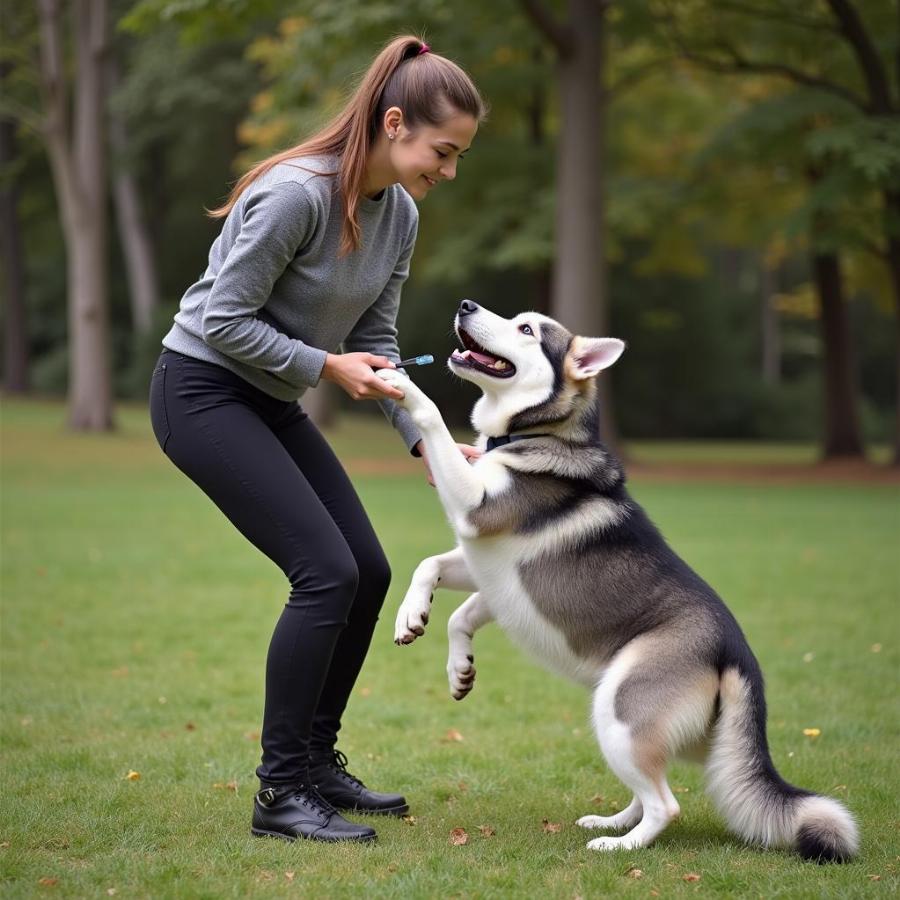The age-old question, “what dogs are closest to wolves?” sparks curiosity in many dog lovers. Understanding the genetic link between our domesticated companions and their wild ancestors offers a fascinating glimpse into canine evolution and can even shed light on certain breed traits. This article delves into the science behind canine ancestry, exploring which dog breeds share the closest genetic makeup with wolves and what that means for their temperament and characteristics.
Decoding Canine DNA: The Science Behind Wolf Ancestry
Scientists have used advanced genetic analysis to pinpoint the dog breeds most closely related to wolves. This research helps us understand not only the evolutionary path of dogs but also the genetic basis for certain breed-specific traits. Surprisingly, some popular breeds share more wolf DNA than others.
Which Dog Breeds Are Genetically Closest to Wolves?
Several breeds stand out as having a closer genetic relationship to wolves than others. These breeds often exhibit certain physical and behavioral characteristics reminiscent of their wild ancestors. Some of the breeds consistently identified as being genetically close to wolves include the Shiba Inu, Shar-Pei, Akita, Alaskan Malamute, and Siberian Husky.
Shiba Inu: Ancient Lineage and Independent Spirit
The Shiba Inu, a small but spirited breed from Japan, boasts a remarkably close genetic link to wolves. Known for their independent nature and fox-like appearance, Shiba Inus possess a primitive charm that harkens back to their wild ancestry.
Shar-Pei: Wrinkled Wisdom and Protective Instincts
The Shar-Pei, with its distinctive wrinkled skin and ancient Chinese origins, is another breed closely related to wolves. While their appearance might not immediately scream “wolf,” their genetic makeup tells a different story.
Akita, Malamute, and Husky: Working Dogs with a Wild Streak
Breeds like the Akita, Alaskan Malamute, and Siberian Husky, all hailing from colder climates, also share significant genetic similarities with wolves. Their history as working dogs, often used for sledding and guarding, reflects the strength and endurance inherited from their wild counterparts. These breeds often display a strong prey drive and a pack mentality, requiring experienced owners to manage their inherent instincts. Are you interested in learning more about dogs with pricked ears, a common wolf-like trait? dogs with pricked ears
Does Genetic Proximity to Wolves Equal Wolf-like Behavior?
While genetic closeness plays a role, it’s essential to remember that environment and training heavily influence a dog’s behavior. Just because a breed is genetically closer to a wolf doesn’t mean it will behave like one. Socialization, training, and responsible ownership are crucial for shaping a dog’s temperament, regardless of its ancestry.
The Role of Socialization and Training
Early socialization and consistent training are paramount, especially for breeds with a strong prey drive or protective instincts. These practices help channel their natural tendencies into desirable behaviors, ensuring they become well-adjusted members of the family. For more information about dog breeds closely related to wolves, check out this resource: dog breeds closest to wolves
 Huấn luyện chó giống sói
Huấn luyện chó giống sói
What Is the Closest Dog to a Wolf? A Closer Look at the Research
While several breeds share a close genetic relationship with wolves, pinpointing the absolute closest is complex. Ongoing research continues to refine our understanding of canine evolution and the specific genetic markers that link dogs to their wild ancestors. Discover more about the fascinating connection between dogs and wolves in this article: what is the closest dog to a wolf. Are you curious about shedding in different breeds, including those related to wolves? Check out this helpful article: do chow chow dogs shed
Conclusion: Appreciating the Wolf Within
Understanding which dogs are closest to wolves offers a fascinating insight into canine history and breed diversity. While genetic proximity plays a role in certain breed traits, responsible ownership, socialization, and training are the ultimate keys to shaping a well-balanced and happy canine companion.
FAQ:
- Are wolf-like dogs more aggressive? Not necessarily. Aggression is influenced more by environment and training than pure genetics.
- Can I own a dog that’s closely related to a wolf? Yes, but research the breed thoroughly and ensure you can meet their specific needs.
- Do wolf-like dogs require special training? They often benefit from experienced owners and consistent training to manage their natural instincts.
- What are the common characteristics of dogs closest to wolves? They often have pricked ears, a dense coat, and a wedge-shaped head.
- Are these breeds good with children? It depends on the individual dog and its socialization. Early exposure to children is crucial.
- Do these breeds howl more than others? Some do, as howling is a natural form of communication for wolves and some related breeds.
- Are these breeds difficult to train? They can be independent and require patience and consistency, but they are also intelligent and capable of learning.
Beaut Dogs is your trusted source for all things canine, providing expert advice and resources to help you navigate the world of dog ownership. From breed selection to training tips, we’re here to support you every step of the way. For personalized guidance and answers to your specific questions, reach out to us via Email at [email protected]. Let Beaut Dogs help you build a strong and loving bond with your furry friend. Visit us at https://beautdogs.com.